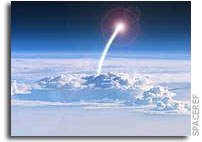Science Democrats Examine Suborbital Space Industry’s Request for “Learning Period” before Federal Safety Rules Are Imposed

(Washington, DC) – Yesterday, the House Committee on Science, Space, and Technology’s Subcommittee on Space and Aeronautics held a hearing entitled, “The Commercial Suborbital Reusable Launch Vehicle Market.” The hearing examined the potential launch markets and applications for commercial suborbital reusable launch vehicles, the progress of some of the companies planning to offer suborbital services, the potential of these suborbital vehicles for scientific research, and the regulatory uncertainties that currently have the most impact on the emerging commercial suborbital space industry. The Subcommittee heard witness testimony from a diverse panel of researches and industry representatives. A representative from an aerospace consulting firm that had just completed a demand forecast of suborbital reusable vehicles also testified.
Rep. Donna Edwards (D-MD) said in her opening statement, “It is clear that developing commercial suborbital systems has been a challenging undertaking. At a 2003 joint House-Senate hearing on commercial space transportation, companies predicted that commercial suborbital flights could be anticipated as early as 2006. A few years later, at a hearing held by this Subcommittee in April 2005, an industry representative estimated that service could begin in 2008 or 2009. I am encouraged by the progress being made by competing designs, and I look forward to continued accomplishments. I would like to better understand what challenges this emerging industry has encountered in getting to where it is today, and what hurdles remain.”
Summarizing the results of her firm’s study, Ms. Carissa Christensen of the Tauri Group, said that the largest market for commercial human spaceflight is by far for individuals, and that given current prices, most of these individuals will be wealthy and be from outside the United States. Industry representatives–Mr. George Whitesides of Virgin Galactic, Mr. Bretton Alexander of Blue Origin, and Mr. Andrew Nelson of XCOR Aerospace–provided an update on their companies’ progress and all pointed to the need for a “learning period” to gain operational experience. They requested that FAA not be allowed to impose safety regulations until such experience was gained. Dr. Alan Stern, testifying in his capacity as Chairman of the Suborbital Applications Researchers Group, said that he expected high demand in several science areas, including upper atmospheric research, space life sciences, and aural and ionospheric research. Dr. Stephan McCandliss, a Research Professor at The John Hopkins University, testified that the challenge for developing reusable suborbital vehicles as meaningful research platforms will be to identify the appropriate niche markets, both commercial and scientific, where either human-in-the-loop or an in-situ access module provides some essential new scientific opportunity or technical capability. He also noted that most of the cost of carrying out a suborbital investigation goes well beyond the mere cost of the launch as it will be necessary to develop both instrumentation and infrastructure for collecting and recording data, along with integration and testing facilities.
Ms. Edwards questioned witnesses on a number of issues such as how suborbital markets will develop; how investigations would be handled in case of a mishap, including the role of federal government; the feasibility of flying sensitive scientific instruments in the same vehicle with passengers; and about the impact of regulatory uncertainties.
After the hearing, Ms. Edwards said: “Today’s hearing clearly shows the importance of continued dialog between FAA and the suborbital space industry as well as the need to keep Congress apprised of their progress as it considers future legislation in this area. At the hearing, industry witnesses called for at least eight years of data-gathering after revenue flights commence before mandating FAA regulations. That would mean that space flight participants would continue to fly under the informed consent regime, otherwise characterized as “fly at your own risk” for an extended period. While I recognize the need for the industry to gain experience similar to the situation that existed in early aviation after Orville Wright’s first flight, it should be noted that people did not pay to fly on the first commercial airline until more than a decade passed after the Wright flight, contrary to what is being contemplated by the suborbital industry. While it is the space flight participants’ decision to fly at their own risk, the possibility of NASA- or NSF-funded researchers and scientists being on these early flights under that regime gives me pause. It is important that we have a clear and common understanding of the type of information and experience the suborbital space industry and FAA need to prepare effective federal safety rules, and I look forward to continued oversight on these matters.”
Please visit our website: http://democrats.science.house.gov









